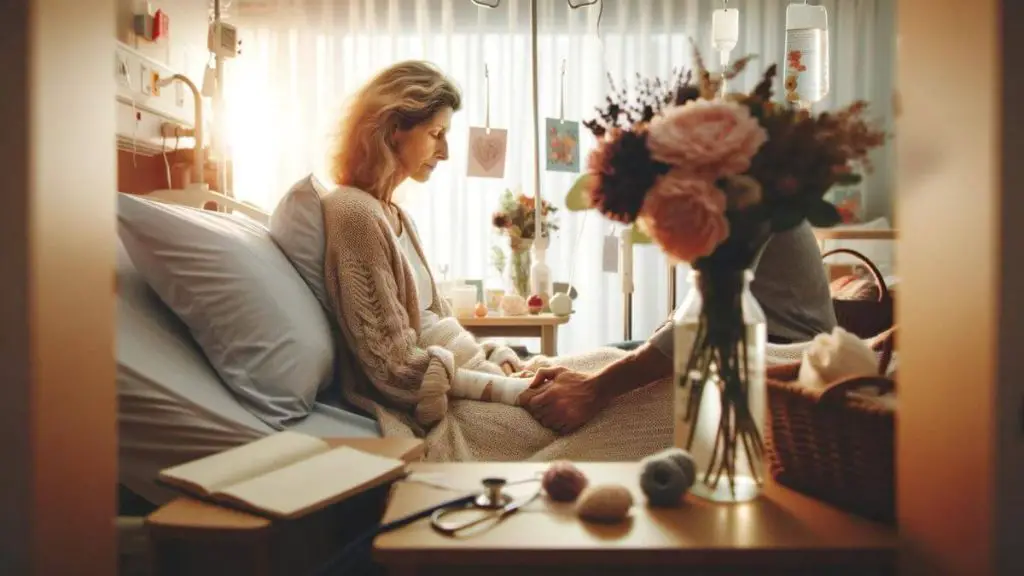Loving a Woman with Two Chronic Diseases
loving a woman with two chronic diseases has been both a challenge and a journey of profound love and understanding for me. As my wife battles with endometriosis alongside another chronic illness, I’ve witnessed firsthand the strength and resilience she embodies every day, inspiring me to support her in every possible way.
Loving a woman with two chronic diseases involves a number of complexities. You care for somebody facing multiple health challenges and the emotional, physical, and practical aspects of being a caregiver highlight the importance of your empathy, and communication skills amidst health struggles.
Scroll down to explore more about this journey of love and resilience.
- Loving a Woman with Two Chronic Diseases
- Understanding the Complexity of Chronic Illness in Relationships
- Recognizing the Impact of Endometriosis and Fibromyalgia
- Caring for a Partner with Multiple Health Conditions
- The Dynamics of Caregiving and Romantic Love
- Practical Steps for Chronic Disease Management in Relationships
- My Personal Journey of Loving a Woman with Two Chronic Diseases
- Learning and Growing Together with Chronic Illness
- Nurturing Intimacy When Managing Chronic Conditions as a Couple
- Respecting Your Own Mental Health as a Chronic Illness Caregiver
- The Role of Family in Managing Chronic Illness
- Exploring Love Beyond Illness & Embracing the Uncertainties of Life
- Societal Stereotypes in Loving Someone with Medical Conditions
- Celebrating the Strength of Loving and Supporting a Chronically Ill Partner
- Source Links for Loving a Woman with Two Chronic Diseases
Loving a Woman with Two Chronic Diseases
Embracing the heart and hurdles of loving a woman with two chronic diseases, my life weaves through the threads of endometriosis and fibromyalgia with dedication and compassion.
As a chronic illness caregiver, my commitment transcends routine partnership—evolving into a deeply empathetic support system amidst our shared life. Approaching each day with patience and resilience, I am constantly learning the intricacies of giving care while nurturing our loving bond.
The task of supporting a partner with health conditions is not a path of ease, but one of profound love and collective strength.
In this journey, my story unfolds in shared struggles, triumphs, and an unwavering commitment to the woman I cherish, despite the complexities her health conditions bring into our lives.
Understanding the Complexity of Chronic Illness in Relationships
In my experience, loving someone with a chronic illness such as endometriosis or fibromyalgia requires an ever-present mindfulness toward the interwoven physical and emotional layers of our shared existence.
Acknowledging the profound intricacies of these diseases is just the starting point to navigating health challenges in a relationship. It’s an evolving journey that demands mutual recognition of the hardships faced, and a dedication to chronic disease management as a cohesive entity.

The Emotional Toll of Chronic Disease on a Partnership
The burden of chronic disease doesn’t rest solely on the shoulders of the one diagnosed. As partners, we share the emotional toll, and it’s crucial to acknowledge that the mental health of both individuals bears great significance.
The reality is that conditions that persist and fluctuate, like fibromyalgia and endometriosis, can cloud the skies of our emotional landscape. Whether it’s managing fatigue or navigating the healthcare system, these challenges can lead to feelings of frustration and helplessness, impacting our relationship if left unchecked.
Navigating Health Challenges as a Unified Front
My commitment to loving and supporting a chronically ill partner goes hand-in-hand with the earnest effort to manage health issues as a couple. Embracing a unified approach means regular check-ins to understand each other’s evolving needs, engaging in empathetic communication, and fostering the necessary support that reinforces our bond.
By facing these adversities together, we fortify our resilience and ensure our relationship nurtures the vibrant, loving connection that brought us together.
Recognizing the Impact of Endometriosis and Fibromyalgia
When it comes to navigating relationship dynamics, the need for chronic illness support for partners becomes particularly essential when one is loving someone with medical conditions like endometriosis and fibromyalgia. These health challenges introduce a spectrum of difficulties that deeply affect both parties involved.
From persistent fatigue to excruciating pain, endometriosis and fibromyalgia are conditions that can infiltrate every facet of life. My wife’s struggle extends beyond the physical symptoms; it encroaches into our plans, our interactions, and the intimacy we share.
As her steadfast supporter, my role is not just about providing comfort during the flare-ups; it is about understanding the deep-seated intricacies of these illnesses and adapting our lives together to accommodate the unpredictability they bring.
- Navigating through the complexity of daily routines.
- Adjusting social commitments to prioritize health.
- Ensuring open dialogue about physical and emotional needs.
- Cultivating patience and mutual understanding during difficult times.
In the realm of loving someone with medical conditions, empathy plays a key role. It’s one thing to know the clinical facts of endometriosis and fibromyalgia, but another to keenly resonate with the lived experience of your partner. This empathy paves the way for a nurturing environment where chronic illness management becomes a shared endeavor rather than a solitary battle.
- Learning together about each condition’s nuances and triggers.
- Identifying the best medical specialists and treatments available.
- Exploring holistic approaches to supplement traditional medical care.
- Committing to regular health and wellness check-ins to monitor progression and manage symptoms effectively.
The continuous interplay between providing chronic illness support for partners, taking on a caregiver role, and nurturing the romantic aspect of our relationship, presents a unique challenge. Yet it is through this intricate dance that our bond solidifies, revealing the true depth of our commitment to one another.
Embracing the full spectrum of my role as we tackle endometriosis and fibromyalgia, I deepen my resolve to care for, support, and love my partner unconditionally through every twist and turn.

Caring for a Partner with Multiple Health Conditions
Embarking on the journey of caring for a loved one with chronic diseases, such as endometriosis and fibromyalgia, I’ve found that at the core of every action, decision, and sacrifice, lies a deep well of empathy. It’s not just a measure of understanding their pain and the complexities of their conditions, but a commitment to approach each day with sensitivity and compassion.
This celestial balance of empathy and practical support forges the steel of our relationship, allowing us to navigate through the storm with grace and tenacity.
Empathy Is the Core of Supporting a Chronically Ill Partner
For me, empathy in relationships isn’t just about acknowledgment; it’s about truly feeling the pulse of my partner’s experience—her struggles, her pain, and her yearnings.
It’s about being present in the most tumultuous times, exhibiting patience when the wait seems endless, and holding her hand through every medical appointment, knowing that our shared language of love is strong enough to overcome the hurdles that life throws our way.
Maintaining a Balance Between Self-care and Caring for Your Loved One
As essential as it is to provide unwavering support to my wife, self-care for caregivers is the beam that supports the structure of resiliency. I carve out precious moments for rejuvenation – a morning run, an evening meditative practice, or simply sipping coffee in quiet reflection.
By keeping my well-being in check, I am better equipped to offer the caliber of care that my partner deserves. The dynamics of balancing caregiving and personal needs are much like a dance—one where knowing when to step forward and when to step back is crucial for harmony and endurance.
- Regularly scheduled self-care activities to stay emotionally and physically refreshed
- Preserving personal space to nurture mental health and well-being
- Proactively seeking social support from friends, family, and support groups
In the tableau of life’s unending challenges, it is the small rituals of self-care that construct the bulwark against caregiver burnout. In this intricate symphony of love and duty, I persist, ensuring that my partner and our relationship flourish amidst the vicissitudes of chronic illness.
The Dynamics of Caregiving and Romantic Love
As I navigate the ebb and flow of my relationship, the unwavering dynamics of caregiving interlace with the romantic love we share, creating a tapestry of deep connection and understanding.
Chronic illness, with its unpredictable nature, transforms not only the life of the one who bears it but also reshapes the essence of our partnership. It is a transition that demands an evolving role, from partner to caregiver, all while safeguarding the sparks of romance that ignited our union.

Adjusting Caregiver Roles in the Relationship
In the throes of chronic illness, I’ve learned that romance doesn’t fade; instead, it adapts to the contours of our new reality. It is a symphony of adjusting caregiver roles, where my actions, once simple expressions of affection, now carry the weight of sustenance and support.
Our love, now more than ever, is a dance—a delicate balance between fulfilling the duties of care with the tender gestures that remind us of the journey we embarked on together.
Whether it’s ensuring medication schedules are met or accompanying my partner to endless doctor appointments, I stand steadfast.
My role may have shifted, but the commitment to our romantic bond remains unchanged. It’s a conscientious effort, an ongoing dialogue that demands transparency and honesty about our needs and limitations so that we can continue to flourish as partners first—caregivers and recipients second.
True love in the presence of chronic illness is not just about maintaining the relationship—it’s about reinventing it, discovering new depths, and celebrating victories however small they may seem. It is about recalibrating our rhythms to the beat of a heart that endures through pain, fatigue, and uncertainty.
- Initiating open conversations about upcoming adjustments in caregiving
- Embracing an adaptable mindset to accommodate evolving care needs
- Preserving affection and intimacy amidst the changing roles
- Recognizing the significance of patience and understanding in enduring love
In my journey of love and caregiving, I’ve cultivated a resilience that reverberates through the cores of both our beings. It’s a reciprocal endeavor, a partnership that honors the transformative power of chronic illness without letting it define the bounds of our connection.
Together, we remain a testament to the enduring spirit of love and the remarkable dynamics of caregiving that paint the canvas of our life together.
Practical Steps for Chronic Disease Management in Relationships
As we continue to navigate the complexities of chronic disease management in our relationship, I’ve realized the paramount importance of laying down clear, practical steps that anchor our journey.
This strategic approach has been fundamental in maintaining not only the health of my partner dealing with endometriosis and fibromyalgia but also the integrity of our connection.

Effective Communication, Discussing Needs and Boundaries
One of the keystones in our relationship has been effective communication. The art of sharing and receiving information with compassion has transformed how we cope with the daily challenges of chronic illness.
By openly discussing our needs and establishing boundaries, we affirm our mutual respect and understanding. Such honest exchanges have been instrumental in curtailing misunderstandings and ensuring that both our emotional and physical needs are met.
- Initiate regular check-ins to stay aligned with each other’s feelings and experiences.
- Express concerns and limitations to fortify understanding and empathy within the partnership.
- Celebrate open dialogue as a safe space, free from judgment or criticism.
- Understand that effective communication is an ongoing process, not a one-time fix.
Collaborative Decision Making for Health Care Management
Equally vital to our relationship has been the practice of collaborative decision-making. When it comes to managing health care, we’ve learned that teamwork can significantly ease the burden.
Whether deciding upon treatment plans, lifestyle changes, or daily logistics, making these decisions together reinforces our sentiment of unity and joint responsibility. This collaboration underlines the trust we’ve built and solidifies our partnership as we face each day with determination and hope.
- Analyze the pros and cons of potential treatments and their impact on our relationship.
- Discuss financial implications and strategize on feasible options for managing healthcare costs.
- Involve one another in the medical research process to ensure informed decision-making.
- Celebrate the victories, no matter how small, as a testament to our teamwork.
In summary, chronic disease management in a relationship is a multifaceted endeavor that demands patience, love, and unwavering support.
Through effective communication and collaborative decision-making, we have not only strengthened our bond but also charted a clearer path in maneuvering the intricacies of chronic illness, all while respecting our individual needs and boundaries.
My Personal Journey of Loving a Woman with Two Chronic Diseases
My personal experience with my wife’s chronic illnesses has been both challenging and enlightening. As I recount my ongoing journey of loving a woman with two chronic diseases, the complex fabric of patience and unwavering support is revealed.
Facing endometriosis and fibromyalgia together has underscored the significance of empathy in the intricate dance of love and care. Each step of this path has been a testament to the boundless capacity for compassion and the unwavering conviction that love can transcend the most formidable trials these conditions pose.
Striving to understand the nuances of these illnesses, I have become acutely aware of the importance of genuine support in a partnership. It is the heartbeat that pumps life into the very essence of our relationship.
As much as chronic illness demands physical care, it has taught me that emotional sustenance is equally vital. Tending to each other’s hearts with as much diligence as we attend to the management of medical conditions has been a profound teacher but the lessons come with their own sets of hurdles and victories.
Reflecting on my experience, I’ve realized there are certain elements central to this journey:
- The unspoken language of presence — being there in every moment of pain and relief.
- Open dialogue — ensuring our communication channels are transparent and adaptive.
- Self-care — acknowledging my own needs to remain strong for both of us.
- Adaptability — learning to evolve with the changing needs of my partner’s conditions.
Navigating the duality of roles being both a partner and a caretaker invites a deeper exploration into the dynamics of our relationship. My continuous quest to balance these elements is motivated by the unwavering love and joy she brings into my life, irrespective of the inevitable challenges we encounter.
In embracing the woman I love, along with her medical conditions, I’ve cultivated a partnership that reverberates with resilience and dedication. It is through the lens of my lived experiences that I write — to share, to inspire, and to celebrate the profound journey of loving someone with medical conditions.

Learning and Growing Together with Chronic Illness
Embarking on this path with my partner, who grapples with both endometriosis and fibromyalgia, has taught me the profound value of chronic illness support for partners. Through both personal resolve and the importance of communication, we strive to learn from each other and grow stronger together.
It has become evident that such support is not solely about providing physical care, but also about nurturing our emotional ties through the challenges we face.
The Significance of Open and Honest Conversation
An essential component of our journey has been fostering open and honest conversation. I’ve learned that discussing our feelings, fears, and hopes with complete transparency strengthens our connection and empowers us to handle the everyday realities of chronic illness.
This process has revealed that maintaining our emotional health is just as crucial as managing physical symptoms.
- Communicating openly about each other’s well-being and personal struggles
- Ensuring that both voices are heard and valued in the relationship
- Building trust through vulnerability and shared experiences
Seeking Professional Support, Therapy, and Counseling Options
Acknowledging the necessity of professional support options, therapy for couples managing illness has been a transformative experience for us. Engaging with counselors who specialize in chronic illness has provided us with new insights and coping strategies, fostering a healthier and more resilient partnership.
- Exploring different types of therapy to find the best fit for our situation
- Utilizing counseling sessions to address the unique challenges we face
- Implementing professional advice to improve communication and support mechanisms
Together, we are navigating the complexities of chronic illness support, bolstered by the value of open communication and the enrichment that professional counseling provides.
Each step forward on this shared path is a step towards deeper understanding and collective well-being in our relationship.
Nurturing Intimacy When Managing Chronic Conditions as a Couple
Intimacy in relationships represents a vital element that flourishes through understanding, tenderness, and the shared experiences that bond us, especially when managing chronic conditions together.
Chronic illnesses like endometriosis and fibromyalgia often test the resilience of a couple’s connection. Yet, in my journey alongside my wife, I’ve found that nurturing closeness with a chronically ill partner imbues our relationship with unparalleled depth and meaning.
In pursuit of maintaining emotional closeness, empathy has emerged as our cornerstone; it bridges our experiences, allowing us to embrace our vulnerabilities and support one another wholeheartedly. As endometriosis and fibromyalgia challenge the body, so too can they strain the spirit.
An unwavering commitment to empathetic communication, therefore, has been indispensable in reinforcing the closeness we cherish.
- Engaging in daily check-ins to express affection and concerns.
- Being attuned to subtle shifts in my partner’s wellness and mood.
- Supporting each other’s self-care practices as part of our routine.
- Creatively adapting date nights to comfortably suit my partner’s energy levels.
Through open communication, I strive to ensure no part of our bond dims due to the overshadowing presence of chronic illness. Such openness paves the way for navigating the complexities these conditions may bring into our lives, allowing us to confront them as a united front.
- Discussing fears and dreams with the same passion and care.
- Sharing in the decision-making process of treatment and care plans.
- Empowering one another to voice needs and desires without hesitation.
The intricacies of fostering intimacy while managing chronic diseases are as nuanced as the conditions themselves, demanding continuous learning and adjustment.
It’s a profound journey we walk together—cultivating the rich soil of our relationship so that despite any storms, the blossoms of intimacy remain ever-present. The challenge of managing chronic conditions together has, unexpectedly, become a powerful catalyst for nurturing closeness, revealing the true strength and tenderness that define the love we share.
The table below reflects the vital practices that have sustained intimacy in our relationship, ensuring we thrive as partners.
| Practice | Importance to Intimacy | Impact on Relationship |
|---|---|---|
| Empathetic Listening | Allows both partners to feel seen and heard | Promotes emotional safety and trust |
| Flexibility in Plans | Respects the fluctuating nature of chronic conditions | Reduces stress and nurtures mutual understanding |
| Shared Experiences | Creates moments of joy and solidarity | Strengthens the bond beyond the realm of illness |
| Continuous Learning | Ensures responsiveness to evolving health needs | Underlines a commitment to growing together |

Respecting Your Own Mental Health as a Chronic Illness Caregiver
As someone deeply committed to caregiving, I’ve realized that nurturing my own mental well-being is just as imperative as my dedication to my partner’s health.
Ensuring my mental and emotional stability is a cornerstone of resilience in caregiving, which requires self-awareness and proactive strategies. It’s by prioritizing caregiver mental health that we can continue to deliver the unwavering support our loved ones depend on.
Acknowledging and Addressing Caregiver Burnout
Understanding the risk of caregiver burnout has been a critical aspect of maintaining my health. Identifying early signs such as exhaustion, irritability, or feelings of detachment has enabled me to take timely action. Addressing caregiver burnout often means stepping back to evaluate and modify my care strategies, incorporating regular breaks, and setting realistic goals for both my partner and me.
- Noticing changes in my mood and energy as indicators to pause and reflect.
- Scheduling respite care to enjoy a necessary hiatus for rejuvenation.
- Setting boundaries to manage my time and energy effectively.
- Seeking professional help if the burden of caregiving feels overwhelming.
Building a Support Network for Caregiver Resilience
Creating a caregiver support network has been instrumental in bolstering my resilience. It’s through the connections with friends, family, and caregiver groups that I gather strength and perspective. The mutual sharing of experiences and advice with those in similar situations fosters a sense of community that’s both comforting and empowering.
- Reaching out to friends and family for emotional backing and practical assistance.
- Joining support groups that offer a platform for shared dialogues and resources.
- Leveraging community resources to assist in various aspects of caregiving.
- Building relationships with healthcare professionals who understand our journey.
Above all, it is the unwavering support from my own network that allows me to maintain a nurturing environment for both my partner and myself. This, in turn, nurtures the continuum of our relationship, maintaining the closeness and strength we’ve worked so diligently to cultivate.
By honoring my mental health and recognizing the significance of a caregiver support network, I embody the resilience needed for this loving, yet challenging, role.
The Role of Family in Managing Chronic Illness
When living and loving through chronic illness, the underrated champions often reside within the wider embrace of the family. In my personal journey alongside my partner, contending with the daily swings of endometriosis and fibromyalgia, the role of my family has been nothing short of pivotal.
They are the reinforcing beams in our complex structure of care, supplementing our individual resilience with shared endurance and unwavering support systems.
Family Dynamics and Support Systems
Reflecting on my experiences, I’ve observed that healthy familial relationships underpin the essence of enduring support systems. It’s through the intricate web of family dynamics that we’ve managed to sustain a cocoon of care, enveloping us in times of dire need.
Families have functioned in concert as caregivers, emotional anchors, and advisors, embedded within the broader framework of managing chronic illness collaboratively.
Understanding each other’s roles, expectations, and capacities has been critical in enabling this support network to flourish.
It’s the open discussions at family gatherings, the Sunday meals where we plan the week ahead, and the shared laughter that bolsters us against the arduous path of chronic disease management. The seamless integration of our family’s support has been the ballast that allows our ship to sail more smoothly on turbulent seas.
Maintaining Healthy Relationships with Relatives
For my partner and me, maintaining healthy relationships with our relatives has required a conscious, dual effort. It is these bonds that amplify our collective resilience and empower us to overcome the everyday challenges of managing chronic conditions. We’ve steadfastly nurtured these connections, recognizing their irreplaceable value in the continuum of our care and emotional well-being.
Offering gratitude, reciprocating support in other aspects of life, and ensuring transparent communication have been our cornerstones for forging lasting familial ties. Moreover, by involving our relatives intimately in the journey—educating them on both conditions, sharing progress, and expressing our needs—we’ve cultivated an enriched environment of empathy and mutual understanding.
My testament to the family’s role in chronic illness is manifold, echoing through our collective actions and the strength we draw from one another. It’s within the quotidian acts of kindness, shared burdens, and joyous celebrations that family proves to be a foundation more sturdy and staunch than I could have ever envisioned, grounding us as we navigate the complexities of chronic health challenges.
In the spirit of highlighting the tangible impact of our support system on managing chronic illness, below is a table summarizing key contributions from family members and their effects on our lives…
| Family Member’s Role | Type of Support Provided | Impact on Our Lives |
|---|---|---|
| Emotional Pillars | Comfort and affirmation through emotional support | Reduces feelings of isolation and strengthens resilience |
| Advisory Voices | Practical advice and diverse perspectives on management strategies | Enhances decision-making and diversifies coping mechanisms |
| Physical Helpers | Assistance with daily chores and errands | Alleviates burden and allows for more restorative time |
| Medical Liaisons | Communication with healthcare providers and companionship during appointments | Ensures continuity of care and bolstered advocacy |
| Recreational Companions | Shared activities and leisure to promote positive experiences | Facilitates relaxation and reinforces social connectivity |

Exploring Love Beyond Illness & Embracing the Uncertainties of Life
Moving through life with a partner facing chronic illness, love beyond illness becomes more than a phrase—it’s the cornerstone of our reality. Embracing life’s uncertainties may sound daunting, but it holds a promise of resilience wrapped in the delicate layers of our everyday existence.
Committed to the belief that an illness does not define a person’s capacity to give or receive love, every moment together intensifies into a profound testament of perseverance.
Our life together, unpredictable as the weather, reminds me daily that there’s no crystal ball to predict our future. Yet, within this maze of unpredictability and challenges, our bond has strengthened, adapting to the rhythms of uncertainty that chronic illness casts. It’s a dance of adaptation, an eternal lesson in relationship perseverance.
Reflecting this journey of commitment, let’s capture the essence of nurturing love in the real-life context of health challenges:
- Experiencing joy in the quiet mornings when wellness graces us
- Standing strong through stormy days when discomfort echoes louder than laughter
- Co-navigating the intricate healthcare systems that become an extension of our relationship’s tapestry
- Cherishing the immeasurable depths of silent understanding and unspoken compassion
One might wonder, how does embracing this lifestyle of uncertainties manifest in tangible ways?
As I reflect on the impermanence that imbues our lives, I’m constantly reminded of the rare strength found in the face of fragility. Loving my partner is not conditional upon the days of health but inclusive of every hour where discomfort prevails. It’s a remarkable journey of deep human connection, fostering a love that moves beyond illness, and respecting the sanctity of our shared existence.
In the table below, I present some of the interactions and practices that have infused our journey with balance and empathy…
| Aspect | Expression of Love and Support | Embracing Uncertainty |
|---|---|---|
| Communication | Frequent, open, and heartfelt dialogue | Adapting to the fluid nature of our ever-changing needs |
| Healthcare Decisions | Joint discussions and respect for each other’s perspectives | Preparation for all outcomes, with hope and without fear |
| Daily Care | Proactive assistance and attending to comfort | Flexibility to adapt to the day-to-day variability of symptoms |
| Emotional Support | Being an empathetic listener and a strong shoulder | Accepting that some days are tougher than others and that’s okay |
Societal Stereotypes in Loving Someone with Medical Conditions
In the journey of love, where one partner faces medical conditions like endometriosis and fibromyalgia, the strength of the relationship often hinges on the ability to surmount societal stereotypes. This includes not only surmounting stigmas that may accompany chronic illnesses but also redefining roles within the relationship that defy traditional expectations.
The embodiment of this resolve is a partnership fortified by love—a love that transcends conventional norms and societal constraints, asserting the true essence of connection and support.
Challenging Gender Norms and Expectations in Caregiving
In the face of chronic illness, caregiving transcends gender roles, and my experiences reflect an evolving dialogue about these roles within our society.
Challenging gender norms has been an integral part of our shared path, where empathy, understanding, and the passageways of care are not assigned by one’s gender but are embraced as mutual outpourings of love and commitment.
My approach has been to provide caregiving not as a duty but as a natural extension of my devotion, an endeavor that we undertake together.
- Rejecting predisposed roles and embracing a fluid, shared responsibility in caregiving.
- Fostering an environment where tasks are not gendered but rather shared expressions of compassion.
- Consciously cultivating a relationship dynamic that respects individual strengths and needs.
Defying Stigma and Emphasizing the Value of Love
Our relationship, seasoned with the complexities of chronic illness, stands as a testament to defying stigma in relationships. The societal stigma associated with chronic diseases can often lead couples down a path of isolation, but we have chosen to invert this narrative and emphasize the unfaltering value of love. At the heart of our relationship lies a resilient kinship that neither judges nor wanes in the face of adversity.
- Engaging in honest dialogue to confront and cast aside stigmatized notions of illness.
- Nurturing a bond that reinforces love as a haven, immune to the shadows of misconception.
- Valuing the profound impact of an empathetic, stigma-free partnership on health and happiness.
By intersecting the paths of overcoming societal stereotypes, challenging gender norms, defying stigma in relationships, and the irreplaceable value of love, our story encourages others to view love as a defining force, capable of transcending and transforming the narrative around medical conditions and caregiving.

Celebrating the Strength of Loving and Supporting a Chronically Ill Partner
Okay, let’s wrap the “Loving a Woman with Two Chronic Diseases” piece up!
In this journey of the heart that embraces the complexities of chronic illness, celebrating strength in love becomes more than an act of resilience—it transforms into a profound affirmation of life’s most tender connections. The steadfastness required in supporting a chronically ill partner serves as a testament to the love and strength that characterize this unique partnership.
Each day brings its own set of challenges, yet it is the courage, patience, and unwavering support that shine as beacons of hope and solidarity.
Weaving together the fabric of care and compassion, my personal narrative echoes with a resounding commitment to not only uphold, but to cherish the rich tapestry of our life together. The trials we encounter while managing the demands of chronic conditions are the very crucibles that forge a more profound understanding and a deeper intimacy.
The act of supporting a chronically ill partner goes beyond duty; it’s a conscious choice to stand firm, shoulder-to-shoulder, against an often unpredictable opponent.
Finally, the celebration of strength in our shared journey is more than an acknowledgment of hardship—it is a recognition of the beauty and durability of a love that refuses to be weakened by illness. It is within these experiences—raw and unguarded—that we find the most authentic expressions of human strength and connection.
My story, while uniquely mine, is one shared by many who similarly navigate the dance of love and care, and to those fellow travelers, I offer my solidarity and respect for the intricate balance we maintain each day.
If you would like to share your own story about loving a woman with two chronic diseases, do share it in the comments section below. Thank you!


About Me
Hi, I’m Lucjan! The reason why I decided to create this blog was my beautiful wife, who experienced a lot of pain in life, but also the lack of information about endometriosis and fibromyalgia for men…
